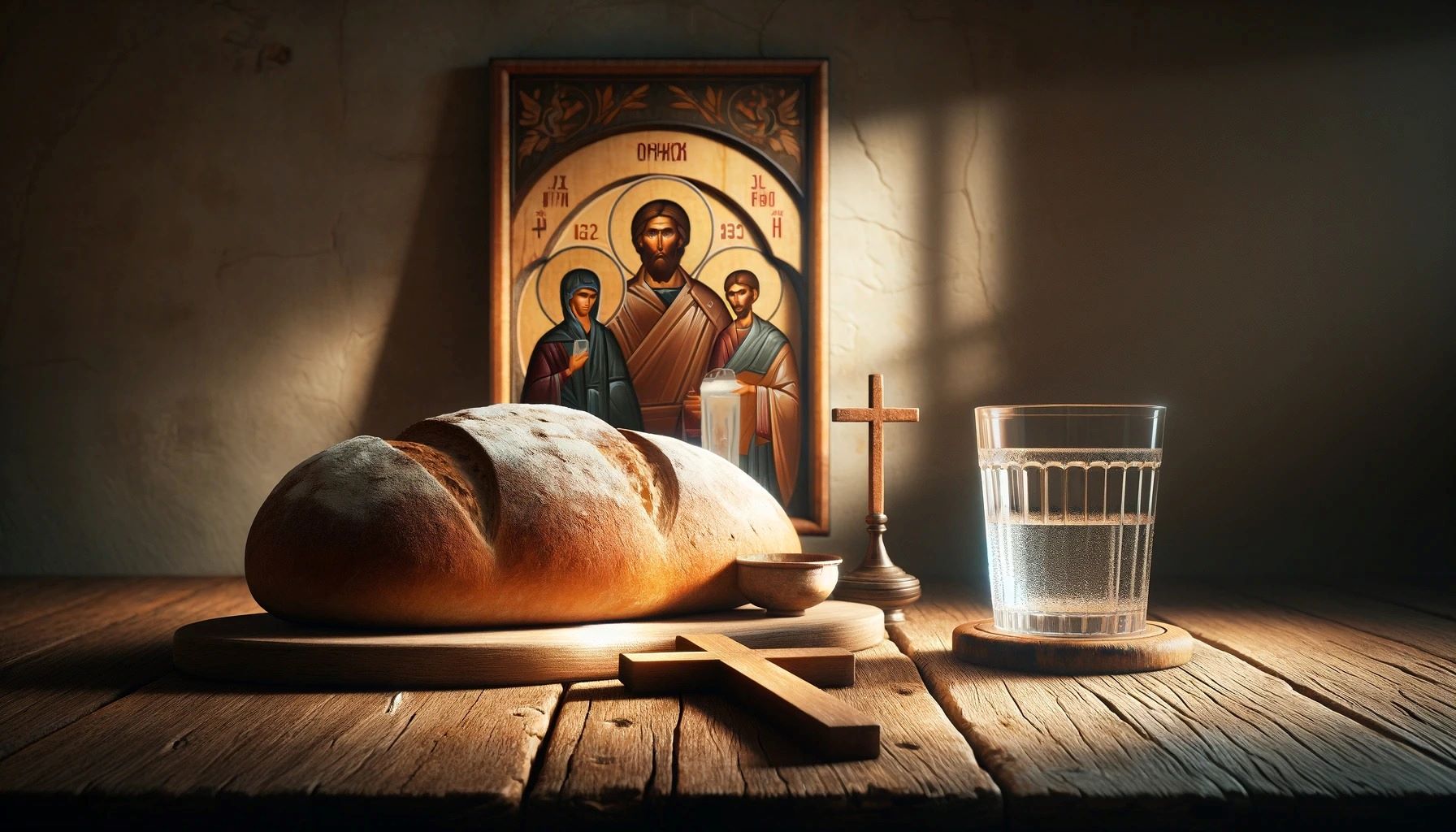Home>Special Themes>What Prayer Is Omitted During Lent


Special Themes
What Prayer Is Omitted During Lent
Published: February 27, 2024
Ericka Andersen, an editor at Christian.net, expertly merges digital strategy with content creation, focusing on faith and societal issues. Her communication skills enhance the platform's engaging narratives, fostering meaningful dialogue on belief's impact on society.
Discover which prayer is omitted during Lent and the significance of this special theme in the Christian tradition. Explore the meaning and impact of this Lenten practice.
(Many of the links in this article redirect to a specific reviewed product. Your purchase of these products through affiliate links helps to generate commission for Christian.net, at no extra cost. Learn more)
Table of Contents
The Purpose of Lenten Prayer
Lenten prayer serves a crucial purpose in the Christian faith, particularly during the Lenten season. This period, which spans 40 days, is a time of reflection, repentance, and spiritual growth. The purpose of Lenten prayer is to deepen one's connection with God, seek forgiveness for shortcomings, and prepare for the celebration of Easter. It is a time for believers to engage in self-examination, prayer, and acts of self-discipline, with the aim of drawing closer to God and embracing the transformative power of His love and grace. Through Lenten prayer, individuals seek to realign their priorities, shed distractions, and focus on their spiritual journey.
-
Seeking Spiritual Renewal: Lenten prayer provides an opportunity for believers to seek spiritual renewal and growth. By engaging in prayer, individuals aim to strengthen their relationship with God and experience a deeper sense of spiritual fulfillment.
-
Reflecting on Christ's Sacrifice: During Lent, Christians reflect on the sacrifice of Jesus Christ and the significance of His death and resurrection. Lenten prayer allows believers to meditate on the profound love and sacrifice demonstrated by Jesus, leading to a renewed appreciation for the core principles of the Christian faith.
-
Repentance and Forgiveness: Lenten prayer encourages believers to engage in sincere repentance and seek forgiveness for their sins. It is a time for introspection and acknowledging areas in need of spiritual growth, while seeking God's mercy and grace.
-
Preparing for Easter: Lenten prayer serves as a preparation for the celebration of Easter, the most significant event in the Christian calendar. Through prayer, individuals prepare their hearts and minds to fully embrace the joy and significance of the resurrection of Jesus Christ.
In essence, the purpose of Lenten prayer is to foster a deeper spiritual connection, promote self-reflection, and prepare believers to fully embrace the profound significance of Easter. It is a time of spiritual discipline and devotion, leading to a renewed sense of faith and commitment to living out the teachings of Christ.
Read more: What Prayer Of Mass Is Omitted During Lent
Traditional Lenten Practices
-
Fasting: Fasting is a traditional Lenten practice that involves abstaining from certain foods or activities as a form of spiritual discipline. Many Christians choose to fast from specific types of food, such as meat, dairy, or sweets, during Lent. The act of fasting serves as a reminder of Jesus Christ's sacrifice and allows individuals to focus on spiritual nourishment rather than physical indulgence.
-
Prayer and Meditation: Lenten observance includes a heightened emphasis on prayer and meditation. Believers dedicate additional time to prayer, seeking a deeper connection with God and reflecting on the significance of Christ's sacrifice. This intentional focus on prayer and meditation fosters spiritual growth and introspection.
-
Almsgiving: Almsgiving, or acts of charity and generosity, is another integral aspect of traditional Lenten practices. During Lent, individuals are encouraged to engage in acts of kindness, generosity, and service to others. This practice aligns with the spirit of selflessness and compassion exemplified by Jesus Christ, emphasizing the importance of caring for those in need.
-
Self-Denial: Lenten observance often involves acts of self-denial, where individuals purposefully give up certain comforts or habits as a means of spiritual discipline. This may include abstaining from entertainment, limiting screen time, or refraining from behaviors that detract from spiritual focus. By practicing self-denial, believers aim to redirect their attention towards spiritual growth and reflection.
-
Attending Worship Services: Throughout Lent, Christians attend special worship services, such as Ash Wednesday and Maundy Thursday, which are integral to the Lenten observance. These services provide opportunities for communal prayer, reflection on the significance of Lent, and a collective journey towards Easter.
-
Stations of the Cross: Many churches conduct the Stations of the Cross, a devotional practice that commemorates the events leading up to Jesus' crucifixion. This practice involves meditating on specific moments of Jesus' journey to the cross, allowing believers to deepen their understanding of Christ's sacrifice and the redemptive power of His love.
Traditional Lenten practices are deeply rooted in the principles of self-discipline, spiritual growth, and a renewed focus on the core tenets of the Christian faith. These practices serve to cultivate a sense of reverence, humility, and gratitude as believers journey through the Lenten season.
The Prayer of Alleluia
The Prayer of Alleluia holds significant spiritual and liturgical importance within the context of Christian worship, particularly during the Lenten season. "Alleluia" is a term of praise and exultation, often translated as "Praise the Lord." It is a joyful expression of adoration and thanksgiving to God, commonly found in hymns, psalms, and liturgical prayers. However, during Lent, the Prayer of Alleluia is notably omitted from the liturgy as part of the penitential observance. This intentional omission reflects the solemn and reflective nature of Lent, where the focus shifts towards repentance, self-examination, and spiritual preparation.
The Significance of Alleluia
The Prayer of Alleluia embodies a spirit of jubilation and celebration, signifying the triumph of God's glory and the joy of salvation. It is often associated with festive occasions and expressions of praise, serving as a powerful declaration of God's greatness and majesty. In the context of worship, the inclusion of Alleluia in prayers and hymns elevates the atmosphere with a sense of exuberant worship and gratitude.
Omission During Lent
During the Lenten season, the omission of the Prayer of Alleluia from liturgical expressions serves as a deliberate act of spiritual discipline and reverence. By abstaining from the use of Alleluia, believers enter into a period of solemn reflection, acknowledging the need for repentance and the recognition of human frailty. The absence of Alleluia during Lent underscores the somber tone of the season, prompting individuals to contemplate the weight of sin and the sacrificial love of Christ.
Read more: Why Is Prayer Important During Lent
Symbolism of Omission
The intentional omission of Alleluia during Lent symbolizes a temporary withholding of exuberant praise and joyous expressions, as believers immerse themselves in the contemplation of Christ's journey to the cross. It signifies a shift from celebratory praise to a more introspective and penitential mode of worship, aligning with the overarching themes of repentance, humility, and spiritual preparation during Lent.
Anticipation of Easter
The omission of Alleluia during Lent also carries a sense of anticipation and longing for the impending celebration of Easter. As believers refrain from the exuberant use of Alleluia, they are reminded of the transformative power of Christ's resurrection and the ultimate triumph over sin and death. This intentional pause in the use of Alleluia creates a poignant contrast, heightening the joy and significance of its eventual reintroduction in the Easter liturgy, marking the culmination of Lent and the beginning of the Easter season.
The Prayer of Alleluia, though omitted during Lent, remains a profound expression of praise and adoration in Christian worship. Its intentional absence during this season serves as a poignant reminder of the sacrificial journey towards Easter, infusing the eventual return of Alleluia with renewed meaning and exultation.
Fasting from the Prayer of Alleluia
During the Lenten season, the act of fasting extends beyond abstaining from food or certain activities; it also encompasses a symbolic fasting from the Prayer of Alleluia. This intentional abstention from the use of Alleluia in liturgical expressions represents a profound spiritual discipline and a tangible manifestation of the Lenten journey.
Spiritual Discipline and Reflection
Fasting from the Prayer of Alleluia serves as a spiritual discipline that prompts believers to engage in introspection and contemplation. By refraining from the exuberant use of Alleluia, individuals are invited to enter into a period of solemn reflection, acknowledging the need for repentance and spiritual renewal. The absence of Alleluia creates a space for deeper introspection, allowing believers to confront their own limitations and the transformative power of Christ's sacrifice.
Read more: What Is Omitted From Mass During Advent
Embracing the Solemnity of Lent
The omission of Alleluia from liturgical prayers and hymns underscores the solemnity of the Lenten season. It signifies a departure from celebratory expressions of praise and joy, aligning with the penitential nature of Lent. This intentional fasting from Alleluia invites believers to embrace the somber tone of the season, recognizing the gravity of sin and the profound sacrifice of Jesus Christ. It serves as a poignant reminder of the journey towards the cross and the need for spiritual preparation.
Cultivating Anticipation for Easter
The act of fasting from the Prayer of Alleluia also cultivates a sense of anticipation for the celebration of Easter. As believers refrain from the exuberant use of Alleluia during Lent, they are reminded of the impending joy and significance of Christ's resurrection. This intentional fasting creates a contrast between the solemnity of Lent and the eventual jubilation of Easter, heightening the anticipation for the triumphant reintroduction of Alleluia in the Easter liturgy.
Symbolic Reintroduction in Easter
The fasting from the Prayer of Alleluia culminates in its symbolic reintroduction during the Easter liturgy, marking the culmination of the Lenten season. The return of Alleluia carries profound significance, symbolizing the triumph of Christ over sin and death. Its reintroduction represents a joyous proclamation of the resurrection, infusing the Easter celebration with exuberant praise and thanksgiving. The intentional fasting from Alleluia during Lent amplifies the impact of its eventual return, underscoring the transformative journey from repentance to rejoicing.
Fasting from the Prayer of Alleluia during Lent serves as a powerful expression of spiritual discipline, solemn reflection, and anticipation for the joy of Easter. It encapsulates the essence of the Lenten journey, leading believers through a period of introspection, repentance, and ultimately, the exultant celebration of Christ's resurrection.













